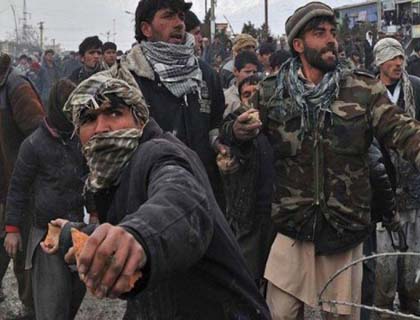Afghanistan of today is a melting bowl of various cultures that are in a wild collision. The widespread demonstrations of recent days over the issue of burning of a few copies of Holy Quran highlighted the deeper realities of an Afghan society that many believed has changed a lot since 2001. What we saw and was on full display was a demonstration of large-scale resentment on the part of a significant section of Afghan population.
The popular belief, prior to the outbreak of demonstrations, was that Afghans now have come to by and large accept the presence of international military coalition and some even believed that Afghans in general would think of these forces fondly after all they have done for Afghanistan and its people for more than ten years. The unprecedented outburst of public anger, therefore, was very surprising not only to the international military coalition present in Afghanistan but also many Afghan observers.
Compared to a few years ago, today and according to my own experience and observations, if you talk to a typical Afghan in any of Afghanistan's major cities, it is more likely that the person might have a negative to ambivalent view of the international military coalition's presence. A few years ago, this likelihood was a few orders of magnitude less.
This resentment is palpable among Afghans. But, on the other hand, there is still a vast segment of Afghan population which is in favor of this presence. In the more stable provinces and regions, mainly in the north, west and center, where people's overall conditions have become better over years, people are still in favor of this presence and these feelings are quite strong.
The recent demonstrations highlight the fact that the international community including the international military coalition present in Afghanistan cannot afford to take for granted a warm reception by Afghans. The deeper causes and the entire range of factors responsible for such a palpable shift in people's attitudes should be researched and explored.
Of course, more than religious sentiments, socio-economic factors play an important part. In fact they lie at the heart of this palpable shift in attitude as I explained in my previous articles. A significant segment of Afghans, rightly or wrongly, believe that "foreigners" (including the international military coalition) are responsible for the deplorable socio-economic situation that they find themselves trapped in.
In recent happenings there are lessons for the international community and the U.S. and other countries engaged here. After all, what matters is where the people and the common man stand. As long as the approach of these countries is one that is security-driven and focuses on the military aspects and as long as their attitude is stuck in a crush-the-Taliban-only mentality, harsh realities on the ground for Afghans will not change.
Under such circumstances, the drift of the public opinion against the international community's military presence would only accelerate. It has long been known and appreciated that the global efforts in Afghanistan should also focus on a viable economic revitalization of Afghanistan. Focusing only on the military aspects and prioritizing short-term gains would only amount to postponement of the day of reckoning.
The situation in Afghanistan until 2014 can be manageable given the extensive presence of resources and the strong back-up provided by to the government of Afghanistan. The outlook of Afghanistan beyond 2014 however remains unclear. However, it is becoming increasingly likely that the conflict situation in Afghanistan would continue for many more years beyond 2014.
This is understandable given the simmering frictions beneath the surface of Afghan society. Influential people from the anti-Taliban block are quietly mobilizing resources and preparing for a worst-case scenario that, however, might never materialize. But in the wilderness of Afghan politics, reaching out for guns has always been easier and more popular than reaching out to the negotiation table. Conflicts have tended to be resolved at the barrel of the gun rather than through coordination.
What might happen in the period ahead until the presidential elections of 2014 will be critical to the future of Afghanistan beyond that. Will the international community facilitate a smooth process of long-overdue reforms in the structures of power and governance in Afghanistan or will shy away from this imperative as it has done before. This is a particularly important area of concern that without active contribution of the international community, it would be incredibly difficult to achieve. The wall of opposing force of vested interests who do not want to see meaningful and fundamental reforms in the structures of power and governance is strong.
In the Bonn II conference and even earlier, we should have seen an enthusiasm on the part of the international community to work towards these imperatives. Unfortunately, we saw no such enthusiasm and it became evident that, on this important count, the international community is faltering and losing focus and interest.
The international community, unfortunately, is very enthusiastic on another count and it is a military withdrawal and partial disengagement from Afghanistan. When a number of French soldiers were killed in Afghanistan a few weeks ago and the French president responded by putting on hold all military relations, it was an unmistakable sign of how fast the will to tough it out in Afghanistan is dwindling.
The fact is that much remains to be done in Afghanistan and with the western patience thinning it is difficult to see any chance of these imperatives getting done. The situation remains worrying and instead of engaging in blame game, some fundamental shift in attitudes should prevail. After all, the government in Afghanistan has to stand up to the challenge of running a chaotic Afghanistan after the disengagement of the international community and it cannot afford to lose time.

